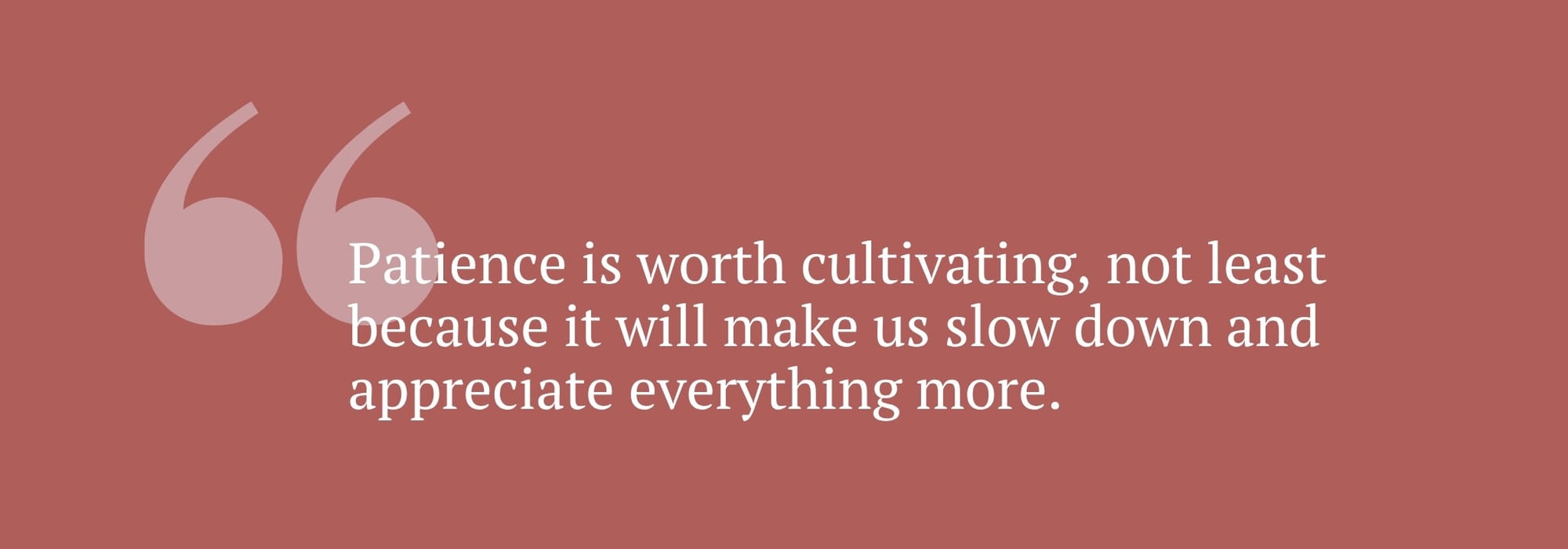Modern society’s desire for instant gratification has made waiting for anything decidedly unfashionable. But learning to be more patient can help you flourish, even in the face of adversity
The speed at which we live life now brings with it impatience. If a video won’t load on Instagram, we scroll on. If a queue is too long, we’ll huff and puff. If a task means grafting for months instead of days, we might find it hard not to seek out easier and more achievable goals instead.
Margaret Whipp, a hospital chaplain, has written her book, The Grace of Waiting, from the specific stance of someone who often sits with patients as they wait for a prognosis, or for the next medical intervention.
She says: “People tell me every day how much they hate waiting. They have tried to be patient. They have struggled to accept not knowing how long they may be kept waiting. They have done their best to embrace not being in control of the outcome of their waiting. But still, as their waiting drags on, they find it hard to be graceful about it.”
Their impatience is no doubt driven by anxiety. They are in a situation where the outcome is out of their control. Patience is a huge ask in this situation, and one many people may be all too familiar with.
What Margaret calls the “sheer grace of waiting” is harder to call upon when you are frightened. But she also writes about how the virtue of patience is now “unfashionable”, saying: “Culture teaches us that waiting is unnecessary… and those who cause it are inefficient, incompetent, and blameworthy.”
A 2020 Ohio University study, published in the Journal of Experimental Psychology, confirmed just this: people will choose time over reward – and the value of a reward decreases the longer you have to wait for it. The study asked participants to choose between smaller coins that they could receive immediately, and large coins that they had to wait seconds for. Dr Claudia González Vallejo, one of the study authors, said that the results were the complete opposite of what the scientists expected.
“We found that in both situations, people did make the trade-off between time and money. It wasn’t that they would just go for a few more cents every time, because the amounts of time were too small to even think about. So, delays matter – even seconds matter to people,” she said. “In general, people are just very impatient.”

So, are we just hard-wired towards impatience? Dr Sarah Schnitker is a professor of psychology and neuroscience at Baylor University, Texas. She explains that our ability to be patient is both genetic and environmental.
“When we are very young, we have fewer life experiences. The ability to be patient at that young age does reveal some genetic component, but nurture, or the environmental component, does also come into play. By the time we get to adolescence or adulthood, it’s going to be really hard to isolate nature versus nurture; instead, we can think about the interactions between the two.”
She adds that there isn’t behavioural genetic data on patience, specifically. What she and her team do have is research on brief interventions to cultivate patience, which shows that patience can grow with intentional practice.
“This would suggest that patience is still malleable. It is not something that’s just set by the time you reach adolescence or adulthood; instead, it is something that experience can shape,” she explains. “It’s both who you are, and how much you have practiced the skills of patience to build habits that support waiting and suffering well.”
This practice can be a result of some adversity in our lives. Dr Schnitker points to the research on post-traumatic growth, for instance, and the effects of different struggles and traumas.
She says: “What you find is a U-shaped curve. Not having any adversity in adolescence and adulthood can actually lead to a lack of character development. But too much is really problematic, because it becomes so overwhelming that you can’t learn and grow from it.” She says that there is “a kind of sweet spot” in terms of the amount of adversity that will help grow patience.
But there is also a tipping point where being too patient can become detrimental. We are all working towards certain goals, and are making choices each day as to whether we wait, keep pushing on, or whether we change our target.
Dr Schnitker explains: “Part of patience is being able to stay regulated, so that you can actually make choices well.” But there is a caveat. “I’ve argued in some of my papers, with good data, that if patience is the only character strength, that’s actually going to be a problem,” she adds. When justice is involved, for example, patience as the only trait could lead to you waiting too long before you speak up. If you have courage as well, this will prompt you to act.
Patience is worth cultivating, not least because it will make us slow down and appreciate everything more. It is also one of our more powerful tools in times of adversity. However, it is one strength among many that we can call upon and nurture. There are times when everyone’s patience is pushed beyond acceptability – and in those moments, other traits come into their own.
As Dr Schnitker states: “We have data showing that it is patience alongside other capacities, like courage, that really promotes flourishing and wisdom.”
Dr Aneesa Shariff, a clinical psychologist in private practice, shares some valuable advice:
Do one thing at a time. In today’s ‘urgency culture’, we are used to multitasking and having lots of distractions that tend to divert us from being able to focus on one thing for a prolonged period. Try slowing things down and doing one thing at a time, turning off alerts, notifications, or any other distractions you are likely to have to help you maintain your focus.
Use your five senses to ground yourself in the moment. The busyness of daily life means we often do things on autopilot. Whether you’re washing dishes, eating a family meal together, or being fully engaged in a conversation, try focusing your attention on what you can hear, see, feel, smell, or taste in the moment to help yourself stay present.
Tap into self-compassion. It can be disappointing and stressful to wait for things to materialise that are out of your control. Try to identify and label the emotion you’re feeling, and offer yourself some self-compassion by acknowledging how difficult things feel right now. Offer yourself the same support you would give to a friend or a loved one.


Comments